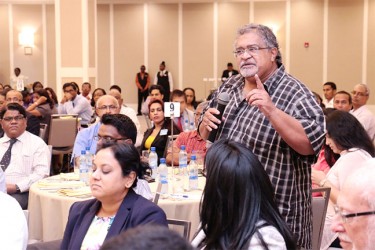Locals and foreigners are afforded a level playing field in the logging sector, President Donald Ramotar says, a position some locals disagree with and one has labelled the president’s blaming of electricity for the lack of value-added processing of logs as “pure hogwash”.
At the Guyana Manufacturing and Services Association luncheon on Wednesday at the Marriott Hotel,

executive of the AH&L Kissoon enterprise, Kim Kissoon took Ramotar to task for saying that electricity was the reason for no value-added processing in the timber industry.
“The argument that electricity is the reason why there is no downstream (processing) in the timber industry is pure hogwash,” Kissoon asserted. “The problem is quality. If you produce, say wamara logs …on which you pay 20% export tax. If you cut it into a square, it is $1050 dollars and the tax is 17%. I don’t know who thinks up these things…you sit down and work it backward. You will see that it isn’t conducive for any manufacturer to do downstream in this country,” he added to applause from most attendees.
Ramotar said that he noted
the point and would check with his technical team to see if Kissoon’s articulations were indeed so and have it corrected.
Earlier, businessman Howard Bulkan declared that foreign investors, “especially the Asians, get more concessions than us and I can send you the correspondence.” He quizzed Ramotar on whether, if reelected, “the playing field will be level” so that locals will be afforded fiscal concessions equal to their foreign counterparts. He added that government recently refused an application from his company for a tariff concession.
Ramotar on hearing the Bulkan name and possibly noting the green shirt he was wearing, mistook him for APNU parliamentarian Ronald Bulkan and began telling him it was his party (APNU) that cut the Amaila Falls Hydropower Project which would have been the “ideal infrastructure” and which would have seen value-added wood products being produced here because of cheaper electricity for processing.
However, Bulkan interjected and informed Ramotar of his name and pointed out that he is not a politician but an entrepreneur of the timber sector.
A seemingly discomfited Ramotar jestingly apologised. “On the fiscal concessions, I don’t agree with you. I don’t think more Asians have more concessions than any other foreign company and I would like you to point out to me, because I have been speaking to our finance people to ensure there is a level playing field. Such a broad statement I do not accept,” the President said. “As far as I am aware… no foreign company should have any advantage over another,” he added.
Chinese logging company Baishanlin has been under scrutiny for seemingly being above the law in relation to its operations. The company has come under intense examination for failing to establish wood processing facilities while all the time engaged in the export of logs. Both Baishanlin and the government have said that its log exports are within allowable limits and there are no illegalities.
Further, the legality of Baishanlin’s landlording arrangement with other forest concessionaires has been queried as the law that would cover this was brought into force long after this arrangement had begun.
Logs have still, however, been drawn from the various concessions. And though it has been here since 2007 and benefited from tax concessions, there is no sign of any progress towards value-added processing as most of its infrastructure, which has been drawn to the attention of the public by the media, seems geared towards logging and shipping.
Bulkan on Wednesday stressed that companies like Baishanlin “are here in a big way and just shipping logs and more logs and our prime species too and there is no processing and no transfer of skills.”
Ramotar’s response focused on exports of logs and why it was necessary and did not deal with the transfer of skills to locals. “Because of the fact that we don’t have all the processing facilities, because also some of the markets, I believe the Chinese market and probably the Indian markets if I am not mistaken, they have a ban on the importation on certain finished wooden products …therefore export of logs to those markets…becomes important for the livelihood of hundreds if not thousands of loggers in many parts of our region…so banning the exportation of logs at this time, I believe, will not be the best thing,” he said.
Meantime, Kissoon lamented the process of exporting food produce to Caricom countries saying that the red tape and non-tariff barriers were many and local exporters’ produce would rot before it can make it to the Caribbean markets. The businessman also asked about a report of a tax review committee that Ramotar had set up to evaluate the country’s taxation system several years ago.
Addressing food exports to CARICOM, Ramotar promised to continue to press Caricom states so that in the future, there can be easier export of crops.
On the report of the tax review committee, Ramotar said, “You have to recognise that when VAT was introduced in our country, we eliminated many other taxes…like the consumption tax. As far as the report you are talking about is concerned, yes, I had set up a committee that I had given this task to do, there was some little problems with the Terms of Reference and so forth. I haven’t had a report on this as yet and I don’t know if they are waiting on us to resolve some of our differences.”
In December, 2011, less than a month after his election as President, Ramotar set up a three-man panel to the taxation system. Opposition leaders, who had campaigned for reductions in the VAT, had criticised the decision to put together the committee without consulting them.





